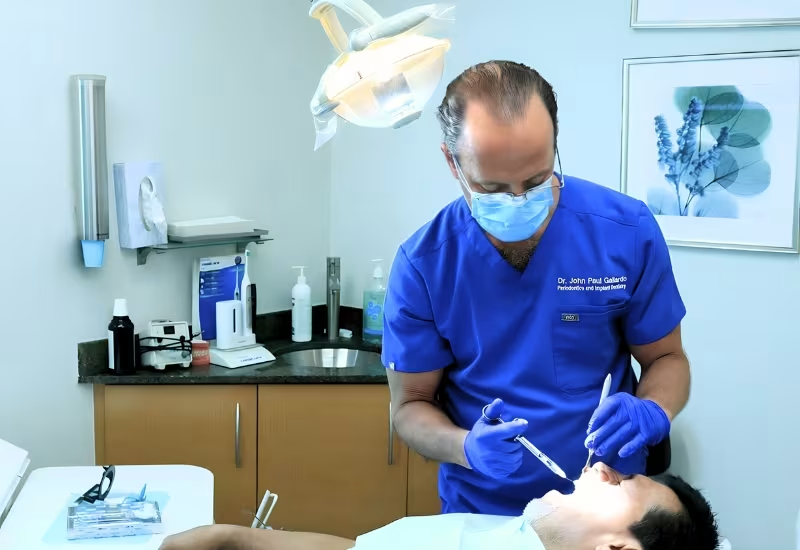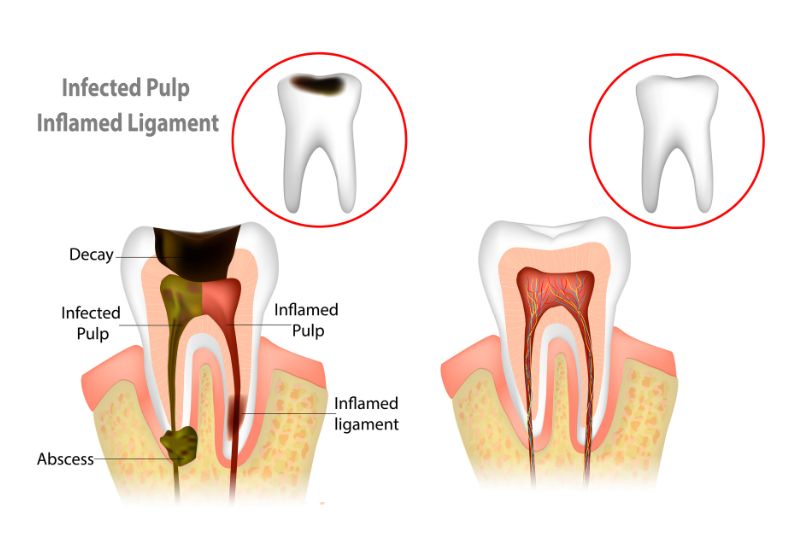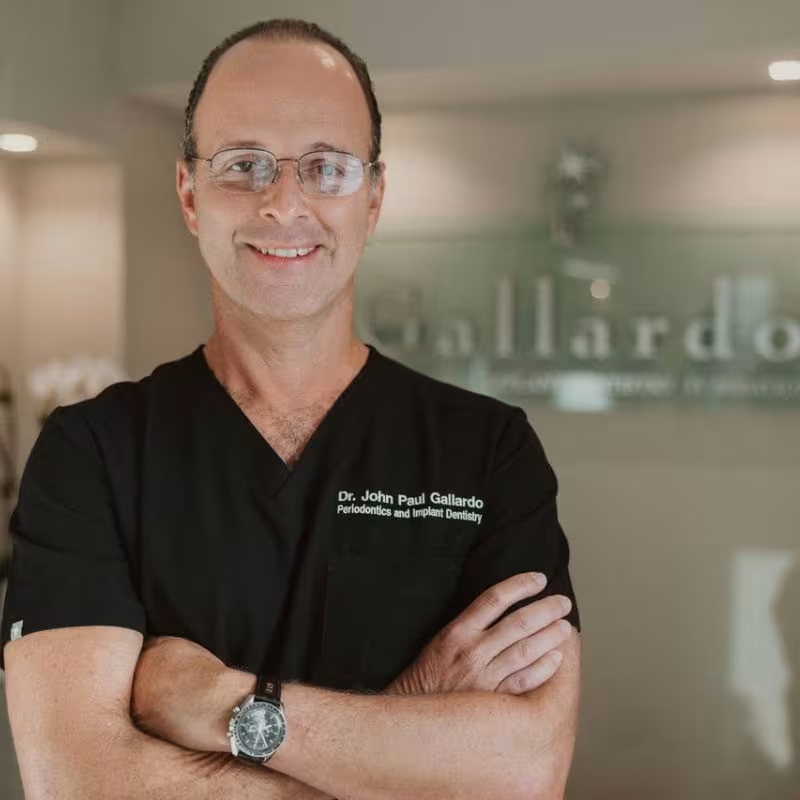
Surgery on teeth, or oral surgery, addresses various dental and oral health issues that cannot be resolved through conventional treatments. We will go through the different types of oral surgeries available at Gallardo Periodontic and Implant Dentistry, sharing our expertise to help you understand them.
Knowing the types of oral surgery can help you feel more prepared. These procedures include tooth removals, dental implants, bone grafting, jaw correction, and gum disease treatments. They are all designed to improve your oral health
What to Know About Oral Surgery
- Tooth Extractions: Removal of decayed, damaged, or impacted teeth, often alleviating pain and preventing further dental complications.
- Wisdom Teeth Removal: Extraction of third molars that may be impacted or poorly aligned, ensuring better oral health.
- Dental Implants: Permanent solutions for missing teeth, integrating artificial roots into the jawbone to restore function and aesthetics.
- Gum Surgery: Treatment for advanced gum disease, involving the removal of infected tissue and promoting oral health recovery.
- Bone Grafting: Reinforcement of the jawbone to support dental implants or correct structural deficiencies.
- Root Canals: Removal of infected tooth pulp to save the tooth and prevent further complications.
- Orthognathic Surgery: Corrective jaw surgery to address alignment issues, improving function and facial symmetry.
1. Tooth Extractions
When it comes to your dental health, sometimes a tooth extraction becomes necessary. This usually happens when a tooth can’t be saved because of decay, disease, or an injury. Oral surgeons handle the procedure, which involves numbing the area, making a small cut, removing the tooth, and then stitching everything up.
2. Wisdom Teeth Removal
Extractions aren’t just for your regular teeth—wisdom teeth often need to be removed too. The teeth next to your wisdom teeth help guide the extraction, making the process smoother. After the procedure, following your dentist’s care instructions is important to avoid any issues. While having a tooth pulled might feel a bit scary, it’s an important step in keeping your mouth healthy.
Your Trusted Oral Surgeon in Miami
Serving patients from Miami, Coral Gables, and South Miami, Dr. Paul Gallardo delivers top-notch surgical care.
3. Dental Implants
Advances in dentistry have made dental implants more effective than ever. Dental implants act like artificial roots for your missing teeth, providing a long-lasting solution to tooth loss. They function just like your natural teeth, allowing you to eat, speak, and smile with confidence. Skilled dental specialists carefully craft these implants to ensure they feel and work just like your real teeth.
The process involves oral surgery, where the implant is securely placed into your jawbone. Dental implants have changed the way we address missing teeth, offering solutions that go beyond just looks. This procedure can significantly improve your oral health and has become an important part of modern dentistry, blending innovation with practicality to keep your smile healthy and strong.
4. Bone Grafting
Sometimes, a bone graft is needed before getting implants to strengthen your jawbone. During a bone graft, dentists might take bone from another part of your body or use special materials to reinforce any weak or damaged areas. This ensures your jaw has enough strength to support the implants, making them more durable and long-lasting.
The process involves oral surgery, where the implant is securely placed into your jawbone. Dental implants have changed the way we address missing teeth, offering solutions that go beyond just looks. This procedure can significantly improve your oral health and has become an important part of modern dentistry, blending innovation with practicality to keep your smile healthy and strong.

Fear-Free Oral Surgery with Dr. Paul Gallardo
With advanced techniques, our patients experience little to no discomfort, CONTACT OUR MIAMI OFFICE TODAY!!
5. Corrective Jaw and Facial Surgery
Corrective jaw surgery, also known as orthognathic surgery, helps fix structural problems in your mouth and face. Maxillofacial surgeons perform this surgery to balance your jaw and facial bones, which might be affected by oral health issues or injuries. These specialists also repair damage from facial trauma or oral cancer through maxillofacial surgery.
This type of surgery also plays a key role in solving functional problems. If your mouth and jaw don’t align properly, it can impact how you speak, chew, and even breathe. Corrective jaw surgery realigns your jaw, enhancing these functions and improving your overall quality of life. It’s an important part of oral health care and is essential for treating a variety of conditions.
6. Gum Disease and Periodontal Surgery
Gum disease is a common issue that dental specialists can treat with periodontal surgery. This surgery involves removing the infected gum tissue, cleaning the area underneath, and helping your mouth heal. Usually, your dentist will recommend gum surgery when less invasive treatments aren’t enough to control the condition.
Periodontal surgery not only stops gum disease from getting worse but also helps restore your oral health by preventing future problems. After the surgery, your teeth can become healthier and your mouth feels refreshed. Following your oral surgeon’s care instructions after the procedure is crucial to maintain your improved oral health. Remember, keeping your teeth and mouth healthy is a team effort between you and your dentist.
7. Root Canals

Root canals are important dental procedures that help fix problems inside your tooth, specifically in the roots or the pulp. During this treatment, your dentist removes the infected or swollen pulp—the soft tissue inside your tooth that has nerves and blood vessels—to relieve your pain. If you’re not familiar, the pulp is what keeps your tooth alive and healthy.
The main goal of a root canal is to save your natural tooth and stop the infection from spreading. After removing the pulp, your dentist will clean and seal the inside of the tooth to prevent more issues. Often, a dental crown is placed on top to strengthen the tooth and restore its appearance. Before deciding on a root canal, your dentist will review your medical history to make sure it’s the best option for your dental health.
Improving Your Oral Health Through Surgery
Oral surgery, from simple tooth extractions to more advanced treatments, is a vital option for addressing various dental issues. Skilled dental specialists and oral surgeons use different surgical procedures to restore function, enhance your oral health, and brighten your smile. Whether it’s a root canal or gum surgery, the process might seem daunting, but the benefits are significant—like getting your teeth back with crowns or bridges, relieving pain from gum disease or wisdom teeth, and achieving a healthier mouth overall.
Restoring your smile usually involves working on both the bones and soft tissues in your mouth. However, thanks to less invasive techniques, your comfort during these surgeries has greatly improved. Look forward to better oral health and keep smiling confidently. Your dentist’s office is the key to your dental wellness, and each procedure, whether it’s an extraction or gum surgery, is a step toward a lifetime of bright smiles, healthy teeth, and excellent dental care.
Choose Top Miami Periodontist Dr. Paul Gallardo for Your Oral Surgery Needs

When it comes to addressing oral health issues that require surgery, trusting the experts is essential. Dr. Paul Gallardo is a highly experienced professional with extensive knowledge in a wide range of oral surgery procedures.
Whether you need a routine extraction, periodontal surgery, or a more complex procedure, Dr. Gallardo and his team are dedicated to providing personalized care tailored to your needs. Schedule a consultation with Dr. Gallardo today to make informed decisions about your dental health.

